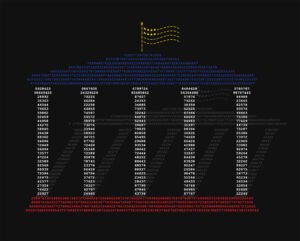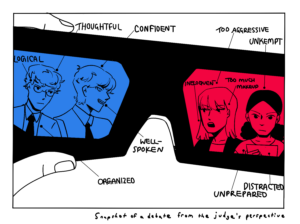On Wednesday and Thursday nights, hordes of 20-somethings can be seen flocking to the MSB or Healy Hall in business attire. Inside, they engage in heated debates about topics ranging from reproductive rights to the ethics of beauty pageants. With (confusingly) similar names, the Philodemic and Philonomosian societies are two different hubs for discourse, debate, community, and rivalry.
While some students may only be familiar with the societies’ flyers on the wall advertising their newest debate topic, many of these clubs’ members believe their debate societies play a critical role in the promotion of free speech on Georgetown’s campus.
Georgetown was ranked the 11th worst for free speech among 250 universities in the Foundation for Individual Rights and Expression’s 2025 College Free Speech Report, which based its data on surveys of undergraduates and recent alumni alongside campus behavioral metrics. The topics these debate societies discuss are contentious, but they also provide an important space for discussion of ideas, members said.
“We are trying to be a center for big ideas and big questions on Georgetown’s campus and, at the same time, really helping tool up students to become better public speakers, to engage with ideas that they disagree with,” Joe Massaua (SFS ’25), a member of the Philonomosian Society, said.
The Philodemic Society was founded in 1830. According to their website, the society is fundamentally about the “protection of freedom and liberty through discussion of ideas.”
“Philodemic follows our long-standing tradition of taking a step away from the partisan nature of [debate], and going towards theories of ethics, literature and history,” Scott Lichamer (CAS ’26), president of Philodemic Society, said.
The recently-revived Philonomosian Society, originally founded in 1839, is a business and current affairs debate society based out of the MSB. In 2023, a group of students decided to re-start Philonomosian after nearly a century of inactivity, Massaua said.
The structures of the societies are also different. Debates in the Philodemic Society center around two sides—affirming or negating a proposition.
In contrast, the Philonomosian Society follows a cohort system. Cohorts are organized from right to left on the political spectrum: Tories, Federalists, Independents, Liberals, and Progressives. Members are divided into these cohorts and can rise to leadership positions within them.
This unique structure lends itself to an entertaining experience. During debates, members of Philonomisan yell “Hear! Hear!” to express agreement and hiss at other cohorts to express dissent. While most speakers abide by the House Rules, those who don’t will be fined a small amount by the censors, appointed members who enforce the rules. The House Rules include a ban on the use of electronics, time constraints for speeches, and a prohibition on “chatter, chuckling, or unbecoming behavior.”
Despite having different practices, both societies emphasize their place on campus as forums for student discussion and freedom of speech.
“Public speaking and freedom of speech come in a lot of different forms,” Massaua said. “Philonomosian, in its own little part, is just helping to advance students being able to disagree respectfully with each other.”
However, some students have misconceptions about the membership of each society.
“A stereotype that I really have been trying to break is: the Philonomosian was the Republican debate society, whereas we were the Democrat society, which is, for the record, very untrue,” Lichamer said. “We’re working on even separating that further to make sure that there’s a real mix of opinions, because I think that’s something very valuable to have.”
Philonomosian Society President James Beit (MSB ’26) said that this issue is particularly salient for the Philonomosian Society.
“As a club, it has conservatives in it, we tend to get lampooned,” Beit said. “As a debate society, it gets very hard because you are, to a certain extent, platforming these beliefs, but you don’t necessarily endorse them.”
While debate societies may not be for everyone, members say free speech on campus is important for every student.
“Free speech is not a bad word,” Massaua said. “It’s a good thing to engage with and that’s what we’re here at Georgetown and at university to do.”
Organizers for both societies said that it’s important to balance their policies with accessibility.
“Tradition is something that is important to the Philodemics,” Lichamer said. “We believe it’s something to guide, not to restrict. So, creating a welcoming environment, having members reach out to freshmen members at the beginning of every debate, is another thing that is a long-standing tradition.”
Meanwhile, the Philonomosian Society is in the process of building its traditions.
“The big difference between us and Philodemics is we don’t really have this institutional memory, so we can kind of do whatever we want or whatever would work,” Beit said. “We’re always for accessibility. A lot of our stuff in the society is optional, like you don’t really have to pick a cohort as a guest.”
No matter which debate society students choose to engage with, they are bound to encounter people and discussions that challenge their beliefs.
“One of my deep, deep held beliefs is that debate and the exchange of ideas are going to be the thing that saves us as American society and as a world,” Massaua said. “If you have a room where you meet every week and you discuss big ideas, you can have really cool friendships emerge.”





